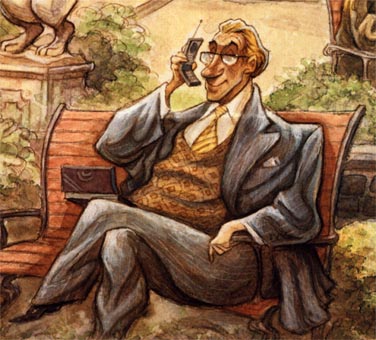Joining the Wired World
According to Lapo
Mazzei, former president of the bank Cassa di Risparmio in Florence, while
businesses are computerized internally in Italy, most Italians have very
limited Internet access from home. On the other hand, they have strong
reasons to be wary: Is the Web secure? Is it safe to give out all that
information to the world? In short, aren't there risks? And why deal with
people you don't know? "Most businesses in Italy are small or medium sized,"
he says. "They are very interested in world markets, but they go about
dealing with them with someone they know. In each country they will have
a contact they trust who will help them."
Accenture's study, Your Choice: How E-Commerce Could Impact Europe's
Future, warns that the Latin, polychronic cultures may let too much
time pass before they join the wired world and find that the world has
left them behind. Its conclusion after interviews with hundreds of European
executives is that Europe is at a crucial crossroads. One road leads to
what the study calls a dead end, with executives sticking to their wait-and-see
attitude and governments opting for restrictive regulations, while wealthy
and adventurous young Europeans roam the global electronic marketplace
to buy cheaper U.S. and Asian goods there. With this choice, Europeans
lose their market share--and jobs--permanently.
The other road is recognizing the strategic potential of electronic commerce,
capitalizing on European pockets of technology excellence (e.g., the Electronic
Data Interchange [EDI] system, the smart card, screen phones) and the
continent's diverse cultural and historical links to expand its trade
to the rest of the world with the euro.
Rosemary O'Mahony, the Accenture partner who led the study and is in charge
of e-commerce for Europe, the Middle East, Africa, and India, feels that
France, with its long history of superior technology, should take the
leadership position in pushing southern Europeans to e-commerce. "With
the Minitel, the French already have this e-commerce culture. Now, with
the euro launched, is the time for them to change over.
"The main French concern is security," O'Mahony continues. "It's a psychological
issue with them. They hate giving away any kind of information. It's true
that in the beginning, when scientists and academics went online, it was
to share information, so naturally there were holes in security. But these
have been taken care of."
Jean-Claude Guez, the French partner of Accenture in charge of the study's
content in France, sees e-commerce now driven in the U.S. by businesses
to individual consumers, but in Europe by businesses to businesses (e.g.,
manufacturers and suppliers) -- for the time being, at least, perpetuating
the separation of private life and business which persists in most of
southern Europe.
Guez notes, "This study is fantastic proof of the weight of our cultural
parameters--our time concept, our religion, our aversion to risk, and
our need for human contacts."
Nelson Lees, director of business marketing for Cincinnati Bell, has lived
in various parts of South America and recently completed a two-year assignment
in Paris. He is well aware of the tenacity of cultural programming and
the importance of Professor Bouchikhi's "pipe" for polychronic countries.
"Even high-level stock analysts have to get inside information from a
member of a company's board."
Nevertheless, an increasing number of French yuppies are impatient with
the weight of bureaucratic regulations and social-welfare taxes, in addition
to the scarcity of venture capital. Within the last few years, 40,000
young French professionals have been leaving annually for the U.K. and
Silicon Valley--unheard of in a country where it has historically been
impossible to persuade a Frenchman to change towns, let alone be an expatriate.
And this from Antoine Rimbault, a shoe manufacturer who has chosen to
stay in France: "Do we have a sense of urgency? Yes! We are more and more
aware of the cost of time. Yes, time is money for us now. As we get more
automated at home and at the office, there is less leisure and obviously
more stress. I have a big Web site. I use the Internet to get clients.
I also use it for conversing with my friends. It's fast, inexpensive,
and asynchronous."
It doesn't sound like giving time to time. But this Frenchman's mother
is Swedish ...
Adapted from an article originally published in the New England Financial
Journal. Illustration copyright © Brian Ajhar.
|
